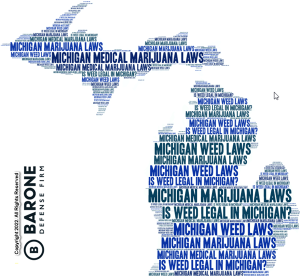Search
Can I Be Charged With a MI OWI After Smoking Pot?
Yes, if you smoke enough marijuana to become impaired, and drive after, you can be charged and eventually convicted for intoxicated driving in Michigan. In fact, every month, more of Michigan’s drivers are being arrested for driving under the influence of marijuana. There are many reasons for this increase in DUI marijuana cases.

Increasing numbers of Michigan’s citizens are using marijuana now that it is legal in the State for both recreational and medicinal use. This includes previous “illegal” users of the drug but also includes new users of the drug, or those who last used sometimes decades ago. Now that the drug is legal, the stigma of its use is largely gone, and those in their 40s, 50s, 60s and even 70s+ are returning to its use.
Navigating OWI DUI Intoxicated Driving Laws under the Michigan Medical Marihuana Act
Important changes have occurred to the State of Michigan Law of intoxicated driving now that both medical marijuana and recreational cannabis laws in Michigan. It appears that Michigan is no longer a “presence only” State, meaning the prosecutor is required to demonstrate that you are driving under the influence of marijuana. In other words, that after consuming marijuana, your ability to operate actually impacted your ability to drive. And this is no easy task.
This legal theory is based on the fact that qualifying patients and caregivers enjoy protection under the Michigan Medical Marihuana Act (MMA) when engaging in the medical use of marijuana. The MMA specifies that registered qualifying patients, possessing an amount of marijuana within defined limits, are shielded from arrest, prosecution, or penalties.
However, certain restrictions, outlined in the MMA, must be observed. Notably, the act does not permit actions such as operating a motor vehicle under the influence of marijuana without consequences.
Today’s Marijuana Has Much Higher THC Levels Especially Edibles
Many of these new or newer marijuana users are unfamiliar with how much things have changed in the past decades. Nearly all marijuana on the market today, recreationally or medicinally, have far higher percentages of THC, the psychoactive ingredient, than in years past. Even the “lower” ranges of the marijuana available at dispensaries have THC levels of 13-15%, which is way higher than anything available in decades past. It’s not uncommon for dispensaries to sell strains of marijuana flowers that are above 20% THC.
Edibles can be far higher than that. This all means that even a single dose/hit of marijuana packs a far greater “punch” than many historical smokers remember.
Then there is an increase in detection. Police officers are on the lookout for the tell-tale signs of marijuana use, first among them being odor of marijuana. Police officers also have tools available to them that didn’t exist in the past, such as roadside testing (still in beta stage in Michigan) as well as advanced training such as ARIDE and DRE training.
Smoking Weed and Driving Can Lead to an OWI Arrest
What’s important to know in all of this is that the penalties for this crime of operating under the influence of marijuana are exactly the same as being arrested and convicted of drunk driving. This is because in Michigan, the statute for both crimes, which is MCL 257.625, defines OWI to mean
operating while intoxicated by virtually any substance. This means that the intoxication element can be based on – meaning caused by – alcohol, and pretty much any other drug, legal or not. In other words, the intoxication in OWI can be caused by any illegal drug, as well as any prescription drug.
The Prosecutor is Required to Show that there is THC in Your System – the Metabolite is Not Enough
When it comes to determining a violation of operating a motor vehicle with a controlled substance, it’s crucial to distinguish between cannabis metabolites and THC. In the landmark case of People v Feezel (2010), the Michigan Supreme Court overturned a previous ruling, emphasizing that the presence of a cannabis metabolite, specifically 11-carboxy-THC, in a driver’s blood is not indicative of impairment while driving.
This is because 11-carboxy-THC is not classified as a schedule 1 controlled substance. As a result, individuals cannot be prosecuted under MCL 257.625(8) solely for having any amount of 11-carboxy-THC in their system. This ruling is particularly significant for drivers not protected by the Michigan Medical Marihuana Act.
License Sanctions for Marijuana Offenses
Understanding the implications of marijuana offenses is crucial, as they come with license sanctions under MCL 333.7408a. First offenses result in a 60-day license suspension, with the possibility of obtaining a restricted license after 30 days. Second offenses within 7 years lead to a one-year suspension, with a restricted license option after 60 days. The Michigan Secretary of State provides a comprehensive guide to offenses and licensing sanctions for drug crimes.
Explore the guide: Michigan Offense Code Guide.
What to do if You’re Charged with a Cannabis Related Offense
So if you smoke pot, become intoxicated, and drive in Michigan, you can be charged just as if you were drunk driving, which means charged with OWI, which is a misdemeanor punishable by up to 93 days in jail , carrying with it a 180-day driver license suspension with no driving whatsoever permitted for the first 30 days.
If you have any questions, then please contact us. We also give free case evaluations for people charged with this crime, and our phones are answered 24/7 at (248) 306-9158.
 Michigan Criminal Defense Lawyer Blog
Michigan Criminal Defense Lawyer Blog

